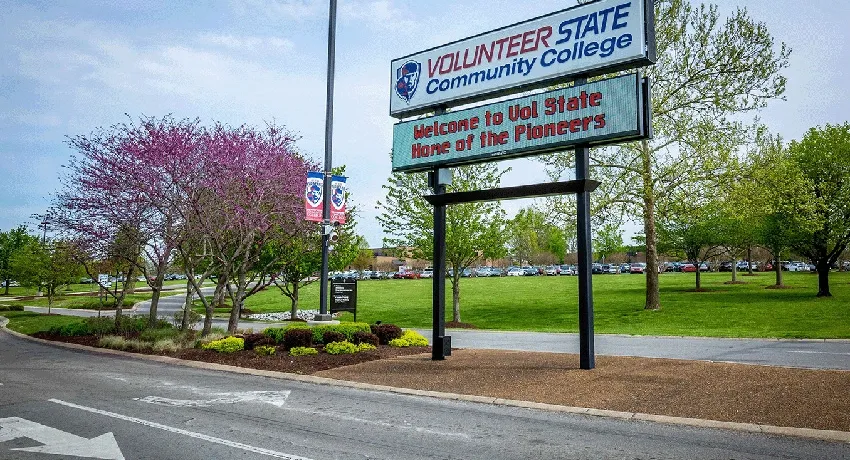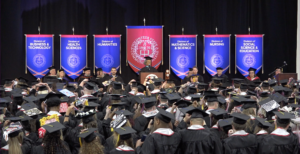By Delaney Holman
As legislation affecting the presence of diversity, equity, and inclusion sweeps the nation, Vol State sees the effects of current bills and TBR decisions.
“Diversity is a term that defines differences among people and so it’s not a theology, it’s not a mindset, it’s not a theory it is an occurring phenomenon, just like math or science is an occurring phenomenon,” said Dr.Karen Hill, Vol State Communication Studies Faculty/Department Chair.
Some states across the country have made efforts to eliminate the words “diversity, equity, and inclusion” from schools.
Tennessee included, a bill passed in the Senate in 2021 paved the way for the current bill, HB 2670. This bill allows students and staff at public institutions of higher education the ability to sue on the grounds of being discriminated against for not accepting, believing, or agreeing upon “divisive concepts.”
The bill defines “divisive concepts” as:
“(A) One race or sex is inherently superior or inferior to another race or sex;
(B) An individual, by virtue of the individual’s race or sex, is inherently privileged, racist, sexist, or oppressive, whether consciously or subconsciously;
(C) An individual should be discriminated against or receive adverse treatment because of the individual’s race or sex;
(D) An individual’s moral character is determined by the individual’s race or sex;
(E) An individual, by virtue of the individual’s race or sex, bears responsibility for actions committed in the past by other members of the same race or sex;
(F) An individual should feel discomfort, guilt, anguish, or another form of psychological distress solely because of the individual’s race or sex;
(G) A meritocracy is inherently racist or sexist, or designed by a particular race or sex to oppress another race or sex;
(H) This state or the United States is fundamentally or irredeemably racist or sexist;
(I) Promotes or advocates the violent overthrow of the United States government;
(J) Promotes division between, or resentment of, a race, sex, religion, creed, nonviolent political affiliation, social class, or class of people;
(K) Ascribes character traits, values, moral or ethical codes, privileges, or beliefs to a race or sex, or to an individual because of the individual’s race or sex;
(L) The rule of law does not exist, but instead is a series of power relationships and struggles among racial or other groups;
(M) All Americans are not created equal and are not endowed by their Creator with certain unalienable rights, including, life, liberty, and the pursuit of happiness;
(N) Governments should deny to any person within the government’s jurisdiction the equal protection of the law;
(O) Includes race or sex stereotyping; or
(P) Includes race or sex scapegoating;”
Across Tennessee, institutions of higher education have been increasingly affected by this series of bills.
The University of Tennessee System is planning to rename its “Division of Diversity and Engagement” to “Division of Access and Engagement.” Following the bill’s statement, “If a public institution of higher education employs employees whose primary duties include diversity, then the duties of such employees must include efforts to strengthen and increase intellectual diversity among the students and faculty of the public institution of higher education at which they are employed.”
Yet, the bill also prohibits institutions from,
“(1) Conducting any mandatory training of students or employees if the training includes one or more divisive concepts;
(2) Using training programs or training materials for students or employees if the program or material includes one or more divisive concepts.”
Vol State does not have a D.E.I. director or personnel overseeing efforts to ensure diversity, equity, and inclusion at Vol State.
“I view that as the mission of everybody,” said Dr.Russ Deaton, Vol State Interim President.
Volunteer State Community College is not exempt from these bills, although passed in 2021 some Vol State faculty were directed to remove the words “diversity” and “cultural diversity” from course descriptions.
“According to the Chancellor’s directive this needs to be removed,” said Hill.
The Tennessee Board of Regents Chancellor Flora W. Tydings is the chief executive officer of the Board of Regents system which oversees all TBR institutions (Vol State included) to set policies and guidelines governing these institutions.
A proposal was also made to the curriculum committee through academic affairs to remove the words “cultural diversity” from Health Sciences and Humanities course descriptions and course learning outcomes.
Out of the 21 voting members consisting of faculty and staff, 16 supported the proposal.
“We were told this was the Chancellor’s directive [removing the words ‘cultural diversity’],” said Hill, “I asked if this was due to or because of a law and I was told the Chancellor has given us a directive because of the divisive concepts law.”
“The Chancellor asked each president to ask each college to avoid using words that could be a distraction or be perceived as political, and sometimes that ‘D.E.I.’ phrase has become that, regrettably,” said Deaton, “not wanting to have anything that distracts from the mission.”
“The mission hasn’t changed […] our mission is one of serving everybody… we serve everybody regardless of what you come here to want to do or what challenges you face. The commitment from TBR and Vol State is that we are going to try to help you overcome those challenges and get you where you want to be,” said Deaton.
Although despite noting that Vol State’s mission has not changed, under the Chancellor’s direction of removing the terms discussed, Vol State’s actual mission statement may have to change as it is listed on the Vol State website, “Volunteer State Community College is a public, comprehensive community college offering quality, innovative educational programs, support, and services. Vol State is committed to building partnerships, strengthening internal and external community engagement, and promoting diversity, cultural awareness, and economic development to prepare students for successful careers, university transfer, and meaningful civic participation in a global society.”
“What good is removing two words from a course description? What purpose is that serving? Are you wanting to erase the diversity of cultures within our institution? Are you wanting to deny the fact that cultural diversity exists or are you wanting to diminish the importance of learning about cultural diversity?” said Hill.
The libguide for Read Across America was taken down from the Thigpen Library’s website due to its discussion of encouraging cultural diversity and inclusion.
Read Across America, a national day celebrated on the birthday of Dr.Seuss is a week designed to show, “Diverse stories provide kids with different perspectives and help them see how others think and feel. Put reading to kids on your calendar all year round. Take NEA’s Read Across America Diverse Books Challenge and help kids of all ages discover their own voices as they learn from the stories of others,” said Marley Dias, Read Across America Ambassador.
The bill states that it must not be interpreted to:
“(3) Infringe on the rights of academic freedom of faculty in public institutions of higher education; […]
(6) Prohibit public institutions of higher education from promoting diversity, equity, and inclusion; provided, that such efforts are consistent with the provisions of this bill.”
Although some signage containing the words “Diversity Matter at Vol State,” has been removed from campus as well as the John Lewis quote in the Ramer Great Hall, “When you see something that is not right, not fair, not just, you have to speak up. You have to say something; you have to do something.”
Following the restrictions the bill places on institutions or higher education, a Vol State faculty member was denied funding to attend a professional development conference, The Southern Sociological Society Conference was considered to include “divisive concepts.”
“In the field of sociology, you’re never ever gonna find a conference that doesn’t talk about race and gender, you’re not, it’s never gonna happen,” said the faculty member whose funding was denied. “The field does talk about all these things were not supposed to talk about according to our legislators.”
Due to the conference discussion of divisive concepts, it therefore violated the TN Divisive Concepts Act, as the bill prohibits institutions from:
“(2) Using training programs or training materials for students or employees if the program or material includes one or more divisive concepts; or
(3) Using state-appropriated funds to incentivize, beyond payment of regular salary or other regular compensation, a faculty member to incorporate one or more divisive concepts into academic curricula.”
“What we teach in our courses has everything to do with cultural diversity,” said Hill.
Not including diversity in curriculum descriptions, and taking efforts to “safeguard” Vol State from impending legislation is, “robbing our students of not only an enriching educational experience, but it’s robbing them of a right to learn,” said Hill.
“Some of the terminology I guess has changed but the mission hasn’t and everything we do now in pursuit of serving everybody hopefully we continue doing,” said Deaton.
“The students in my classroom have demonstrated what our future will be and I am very hopeful for our future because of our students, because of what they see and because of what they know and also because of what they’re learning and that’s why this really does matter because if we stop teaching concepts relevant to those divisive concepts that our legislature says is divisive then this learning doesn’t take place anymore,” said Hill.






Be First to Comment